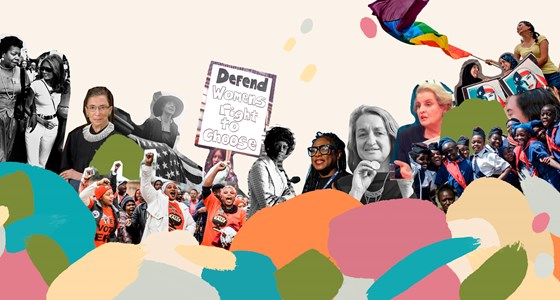Highlight:
- Empower vs shut down
- Virtual and virus free
- Informed but unaccounted for?
- Lawyering up
- Tax to redistribute
- Risk aversion, influence and a just recovery
- TAI Spotlight: When does information lead to greater government accountability?
 An infograph on what gender equality looks like by UN Women. Image Credit: UN Women/Ruby Taylor
An infograph on what gender equality looks like by UN Women. Image Credit: UN Women/Ruby Taylor
People took to the streets for International Women’s Day, often at personal risk, calling for Generation Equality. Some inspiration from the World Bank highlighting how women’s legal rights have evolved over the past fifty years, and TIME spotlighting the role of women-led protests in India’s history, a “powerful validation of women’s role on the frontlines of India’s civil society.” Jalia Kangrave urges a broader definition of taxes to account for economic realities for women, citing how women traders pay a significant portion of their income to use the toilet in Markets in Tanzania and Zimbabwe.
How do we find the data to surface such inequities? Open Data Charter Executive Director, Ania Calderon, talks on the role of open government and open data in tackling gender inequality as World Bank data reveals the need for more women entrepreneurs. The fact that Open Data Day and International Women’s Day were back to back helps us think through the connections. Worrying for celebrants of both is the growing proclivity of governments to employ internet shutdowns. Access Now’s #KeepItOn report sheds light on the repressive use of this tactic last year: 214 shutdowns across 33 countries with India the worst offender with 121 incidents.
While some governments are using the internet as a repressive tool, Taiwan’s Digital Minister, Audrey Tang, have been praised by Japanese netizens for her effort in using digital information on the coronavirus updates, including a real-time map of local face mask supplies to contain its spread in Taiwan.
Essential Read: The Future is Hers

Image credit: Ford Foundation
Be inspired by this new resource from Ford Foundation featuring trailblazing women leaders and organisations rewriting the rules, redefining power, and reimagining what equality looks like. Also, don’t miss the Foundation’s timeline spanning 60 years of changing the game for women and girls worldwide and the unfinished business of gender equality.
Virtual and virus free
As covid-19 wreaks havoc for event planners, many convening in the transparency and accountability field are already canceled or in limbo. The World Bank and IMF Spring Meetings are no exception and Bank staff call for their permanent cancellation. However, that doesn’t mean that exchange and learning have to stop. Helena Rose reflects on what worked and what could be improved from Tax Justice Network’s first virtual conference. Lots for others to take note of. While face to face will always be best for certain circumstances, we suspect the following months will bring home that we can a) we can live without some meetings altogether, and b) we can be more reliant on well-designed virtual events, all while reducing carbon footprints. In the meantime, let’s get creative on how to best repurpose all those project budget lines allocated for travel and face to face events.
Informed but unaccounted for?
How does information contribute to accountability? We are excited to release the TAI-commissioned research from MIT GOV/LAB that should force us to challenge remaining assumptions of any easy path from information availability to governments being held to account. Read more under TAI Spotlight below.
One set of institutions explicitly required to follow up on information are development institution accountability offices. Accountability Counsel shines a light on the benefits, including for conflict prevention of these under-used mechanisms. Change can come as a result of these offices, take this project in Gujarat, India for example. As the accountability framework for World Bank Group private sector arms is under review, have your say, perhaps inspired by these recommendations including a call for a remedy fund.
There is no accountability office for Chinese development finance institutions, but how tenable is that situation as the spread of Belt and Road Initiative projects continues to expand? In the meantime, we see an interesting power dynamic between African and Chinese negotiators as the Natural Resource Governance Institute shares tips on how African negotiators can rebalance asymmetries with their Chinese counterparts.
Should aid be used to fund fossil fuel investments? William Worley walks us through the arguments as Norway’s $1 trillion wealth fund reveal plans to blacklist four companies over their vast greenhouse emissions of greenhouse gases, or at least put them on probation to force them to change. The firm is also stepping up engagement with companies to push its ethical corporate agenda on everything from anti-money laundering to excessive executive pay to green issues. Where production is ongoing, what are the benefits? The Governance and Social Development Resource Centre look at employment of local workers in Angola, Ghana, Nigeria, Sudan and Uganda’s oil industry and suggests the sector remains “an enclave separate from the economies and communities in which it operates.” Not that mining is necessarily much better for local communities. Responsible Mining Foundation’s 2020 report on the mining governance of 180 individual mine sites in 45 countries shows poor application of company-wide policies and practices at the asset level.
Drawing from his recently published journal article, Corruption in the oil sector, Gian Marco Moisé explores two problems of corruption research – one of which is that the use of perception-based indices does not offer a real understanding of the size of the phenomenon, with examples from the extractive industry. Meanwhile , Publish What You Pay launches a three year program in Iraq, Kenya, and Lebanon to help Civil society strengthen oversight of the extractive sector in those countries, the head of OpenOil discusses the EITI’s unique position and capability to drive modelling of extractives data in the public space, and don’t miss this recap from the latest EITI board meeting which features development and outlook for the initiative.
Lawyering Up

In 2017, the Organized Crime & Corruption Reporting Project (OCCRP) published a cross-border investigation into a vast money-laundering operation involving Azerbaijan’s ruling elite. The investigation takes a new turn this year as Bloomberg reveal how the ex-chairman of the International Bank of Azerbaijan allegedly moved tens of millions out of the state-owned firm. The findings could help authorities curb a $128 billion inflow of dirty money to the U.K. However, Paul Radu reflects on the need for investigators to be ready to take on rearguard actions in the U.K. courts and be shrewd in the face of litigation.
Still on graft, France’s former PM, François Fillon’s trial begins over ‘fake jobs’ scandal and Transparency International wants United States congress to pass the Foreign Extortion Prevention Act which will prohibit foreign officials from seeking, demanding, and accepting bribes.
GI-ACE researcher Matthew Page takes a new look at the effectiveness of anti-corruption law enforcement in Nigeria. Check out his key takeaways and policy recommendation as Slovakia also celebrate anti-Corruption party wins, with the party leader promising reforms with police, judiciary, parliament, and regulatory bodies.
Don’t miss this DFID-funded report on how professional communities of planners in South Africa and Zambia live up to their roles as drivers of integrity.
Tax to redistribute
Sebastian Nieto Parra, Mario Pezzini, and Joe Stead explore why OECD countries more redistributive than countries across Latin America and Africa. Bottom line: they are able to finance their welfare states through taxes that themselves reinforce redistribution. Strengthening direct personal income taxation can both mobilise resources and help improve the redistributive capacity of tax systems. To aid tax officials, they can point to the release of IT-tools to fight tax withholding and enable a wider exchange of tax information. Mali may seek to benefit as the country joins the Global Forum on Tax Transparency.
The growing debt crisis among developing countries means tax coffers will need to swell even more. As of now, Eurodad flag the risk of degrading public services and human rights as countries scramble to pay for debts by slashing public services through austerity measures. Somalia is very close to becoming a beneficiary of the HIPC campaign, wiping out $3bn worth of debt.
Risk aversion, influence and a just recovery

Tom Aston agrees that change is difficult, but urges us to make it easier by adopting the Actor-based Change (ABC) framework or outcome mapping to create more effective change by influence rather than argument. Pair with some handy research papers on how shape research for more social impact and a new approach to governance research.
If you wish to innovate rather than transform, understand the different types of innovation that will make you relevant or keep you relevant. For example, look at how the Urban Institute leverages their unique data-driven edge to advise decision-makers.
3IE rolled out a new development evidence portal with a host of new features citation downloads. Hold your horses though, as Equitable Evaluation Initiative Partners wrote a letter to “set the record straight on data”, how to collect it, and how to use it.
Philanthropy, like choosing your team’s lunch spot, is full of risks. Paul Brest and Mark Wolfson’s new paper states “Foundation officers and endowment managers too often prefer exceedingly safe grants and investments because of misapplied principles, biases, and concerns about their reputations.” Ready to sit with the wild kids, the Howard Buffett Foundations seeks to make its mark by working in riskier territory
As the fundraising environment changes, Manmeet Mehta and Michael Zakaras learn to use funds more wisely and Leslie Pine offers 30 lessons on how to creatively leverage your resources. Further inspiration comes from Grassroots International’s in Puerto Rico, where they collaborated with citizens to create a “just recovery” from Hurricane Maria, while the Justice Funders group offer a Resonance framework to guide funders to accelerate a Just Transition. Resonance: A Framework for Philanthropic Transformation is a guide to support you and your philanthropic organization in accelerating a Just Transition by reducing extractive practices and increasing regenerative practices.
TAI Spotlight: When does information lead to greater government accountability?
When does information lead to greater government accountability? | Transparency and Accountability Initiative
Take a deep dive with Varja Lipovšek as she explores our Learning from Evidence Series with MIT GOV/LAB to examine the number of ways that information can lead to accountability and the series of knowledge we have produced to guide the use of evidence to achieve this. Also, don’t miss our evidence syntheses of Within-Government and Citizen-Government Accountability Pathways. Start with the detailed summary here.
Images of empowerment | Hewlett Foundation
To celebrate the International Women’s Day this year, the Foundation launched a free library of photo collection in partnership with Packard Foundation and Getty Images to celebrate the loves and work of women and youth in eleven countries around the world. The images are available free of charge for non-profit use here. (Stay tuned for news of TAI’s photo grant in coming days)
2020 leadership in government fellows announced | Open Society Foundations
Open Society announced their fourth cohort of Leadership in Government Fellows featuring the first Indian American ever elected to the Chicago City Council, a former chief of staff for the Commonwealth of Puerto Rico, an expert on federal consumer regulations, amongst others. The fellows will receive stipends ranging between $100,000 and $133,000 to develop ideas and strategies that advance the values of an open society.
The ever-increasing surveillance state | MacArthur Foundation
President of the MacArthur Foundation, John Palfrey, in an article on Georgetown University website writes on the implication of state-run surveillance system with regards to Coronavirus, social justice and digital rights. “Given the limited degree to which we know all the potential future uses of these technologies, the time to set in place these global protections is now, not once it is too late,” says Palfrey.
How New/Mode helps causes use digital tools to build movements and drive change | Luminate
Learn why Luminate invested in New/Mode, an organisation on a mission to empower people and communities to participate in decisions that impact their lives and drive change on issues that matter.
Calls and job listings
- Job postings at Ford Foundation – Ongoing
Job postings at Luminate – Ongoing
BetterTogether Challenge for innovators – Ongoing
Job postings at Democracy fund – Ongoing - Nominations for the 2020 Anti-Corruption Award – March 16, 2020
- Call for Ideas: Artificial Intelligence and the Climate Crisis (individual applicants not eligible) – March 16, 2020
- Call for Ideas: How can AI-enhanced collective intelligence enable new forms of community responses to the climate crisis? – 16 March 2020
- Opportunities for more tax transparency – webinar for policy makers, Global Reporting Initiative – March 17, 2020
- Hewlett Foundation Call for Expressions of Interest (EOI) to review its grantmaking impact in Mexico – March 18, 2020
Co-Impact systems change grants (round three) – March 31, 2020
Indela funds on digital rights in Latin America – April 4, 2020 - Call for proposals – Swashakt: Empowering women through collectives and group-based approaches – April 14, 2020
- Request for proposal: Independent Public Interest Journalism – April 30, 2020
Call for suggestions on Humanitarian and Development Data Forum agenda – May 2020 - Proposal Submission for the 2020 Summer Evaluation Institute – June 7-10, 2020
Amartya Sen Essay Contest 2020: Illicit financial flows – August 31, 2020 - Call for Submissions to SSIR Series: Social Change in an Era of Extreme Polarization – Last Thursday of every month until early 2021.
Calendar
Please double check the websites for these events to make sure they are still happening – many are subject to change due to the spread of coronavirus.
- Webinar on #ShiftThePower and systems change: How can we map our progress? – March 10, 2020 (Online)
- Peacebuilding around harmful international investments – 11 March 2020 (San Francisco, United States of America)
The Data Delusion: Reclaim Your Collective Rights – March 15, 2020
Media and democracy: the way forward – March 20, 2020 (Rue des Tanneurs 60A, Brussels) - The Impacts of Civic Tech Conference (TICTeC) – March 24 – 25, 2020 (Reykjavik, Iceland)
The Nonprofit Technology Conference presented by NTEN – March 24-26, 2020 (Baltimore, United States of America) - Register for the 2020 OECD Global Anti-Corruption & Integrity Forum – March 25-26, 2020 (Paris, France)
EGAP Learning Days workshop – March 30-April 3, 2020 (Addis Ababa, Ethiopia) - Devex Development Career Forum (exhibitor registration closes 17 March) – March 31, 2020 (Washington, D.C., US)
- Second Meeting of the Tendler Network – April 3, 2020 (MIT, Cambridge, United States of America)
- Harambee – Let’s All Pull Together (largest fathering of Black professional in philanthropy) – April 16-18, 2020 (Raleigh, North Carolina, United States of America)
- Global Technology Governance Summit – April 21-22, 2020 (San Francisco, United States of America)
- Shaping the Future Forum 2020 – April 22 – 23, 2020 (Washington, DC)
- 3ie London Evidence Week Conference 2020 – April 23, 2020 (London, UK)
- Personal Democracy Forum CEE 2020 – April 23-25, 2020 (Gdansk, Poland)
- 2020 International Symposium on Online Journalism (ISOJ) – April 24-25, 2020 (Austin, United States of America)
- Frontiers of Social Innovation: People, Power & Resources: The Redistribution Wave – May 12-14, 2020 (Stanford University, California, USA)
- 2020 Media Impact Forum (funder-only gathering) – June 2, 2020 (New York, United States of America)
- Transparency International: 19th International Anti-Corruption Conference – June 2 – 5, 2020 (Seoul, South Korea)
Human Rights Litigation Summer School at Berlin, Germany – June 8-12, 2020
Women and Girls Africa Summit – June 9-12, 2020 (Durban, South Africa)
RightsCon 2020 – June 9-12, 2020 (San Jose, Costa Rica) - 2020 Neighborhood Funders Group National Convening (philanthropy support to grassroots power building) – June 29 – July 1, 2020 (Washington, DC)
- The 2020 Journalism Funders Gathering (funder-only gathering) – October 6-7, 2020 (Philadelphia, United States of America)
Humanitarian and Development Data Forum – November 2-4, 2020 (Chambery, France)
International Open Data Conference –November 18-20, 2020 (Nairobi, Kenya).

